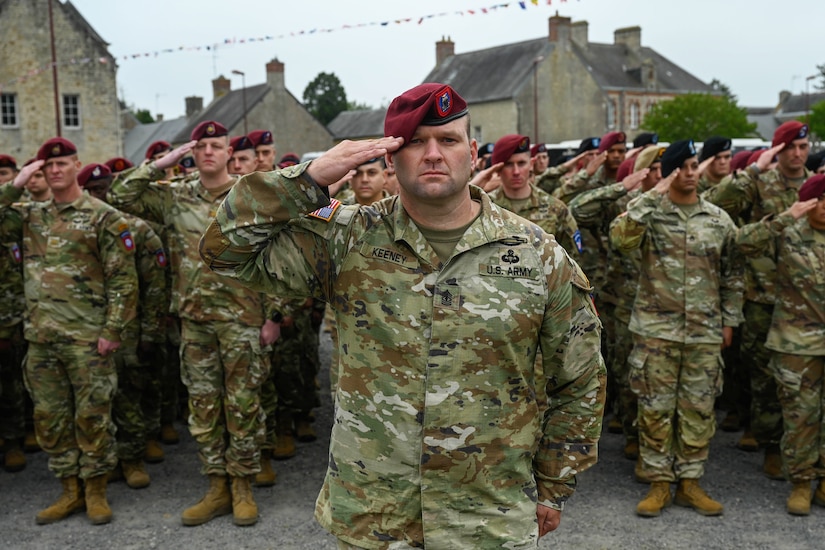Maintaining healthy civil-military relations and taking care of service members is critical to maintaining the success of the Defense Department’s all-volunteer force, Deputy Defense Secretary Kathleen Hicks said today.
Marking 50 years since the military moved away from conscription and filled its ranks exclusively with volunteers, Hicks said the success the all-volunteer force has enjoyed must not be taken for granted.
“That our all-volunteer force has lasted for 50 years, and that we have built the finest force in the world is a testament to its strength. And I believe it remains the best model for the U.S. military,” she said during a fireside chat hosted by the Center for a New American Security, a Washington think tank.
“Yet, even now, we cannot take it for granted,” she said. And we must address and attend to its challenges.”
Military and civilian leaders must remain vigilant stewards of the force, Hicks said, and ensure the call to service that has filled the ranks remains strong.
That starts with ensuring the military remains among the United States’ most trusted institutions, she said.
“We must ensure that, as a society, we are familiar with the military, with military families and what they do and the sacrifices that they make for the nation,” Hicks said.
Critical to maintaining healthy civil-military relations is ensuring the military avoids politicization and remains nonpartisan, a tenet Hicks warned, has been challenged by a widening divide in American politics.
She pointed to the ongoing blanket hold on military confirmations in the Senate, which has held up promotions and appointments for hundreds of general and flag officers.
“This hold is unnecessary, unprecedented and unsafe. It’s bad for the military, it’s bad for military families, and it’s bad for America,” she said, adding that timely confirmations are critical to national security.
In addition to advancing the nominations, Hicks called on Congress to ensure the department maintained the funding needed to accomplish its mission and take care of its people.
“One of the strongest signals of healthy civil-military relations we can send right now is Congress passing [the] fiscal year 2024 defense appropriations — and soon,” she said.
She noted that just 10 days remain until Congress’ latest stopgap spending bill — known as a continuing resolution — expires, and that continued patchwork approach toward funding the government has resulted in years of detrimental delays to new programs, training and permanent change of station moves for service members.
“We cannot afford any further delays,” Hicks said. “I can assure you that Russia and … [China] are not going to slow down while we get our house in order.”
Maintaining healthy civilian-military relations is critical for recruiting and retaining those who are called to serve in the military, she said.
That includes improving societal connections between civilians and service members, even as a smaller military population reduces many Americans’ direct connection with friends, neighbors and family members who have served.
“We can improve societal connections by increasing the visibility of the military through community outreach, by sharing their stories of service so that youth, especially, can better understand who our service members are, what they do, and what they’re most proud of,” Hicks said.
She said military and civilian leaders must also tell younger generations about the various benefits to service — including education and training, financial benefits and the satisfaction of working toward a common purpose with fellow service members.
Furthermore, she said, leaders must ensure military service continues to be rewarding and rewarded.
We know that when we take care of the basic needs of our service members and their families and improve their quality of life, they can focus on their mission to defend the nation.”
Kathleen Hicks, Deputy Defense Secretary
Secretary of Defense Lloyd J. Austin III has made taking care of those who chose to serve a top priority under his tenure.
“As a department, we’ve been working to expand support for our service members and their families, invest in top-tier talent, promote our people and create new opportunities for advancement,” Hicks said, noting that 40% of the DOD budget proposed for 2024 goes toward taking care of its people.
Key among those initiatives is ensuring service members receive competitive compensation and access to affordable child care. The department has also prioritized initiatives to improve spousal employment and food security.
“We know that when we take care of the basic needs of our service members and their families and improve their quality of life, they can focus on their mission to defend the nation,” she said, adding that it is in the nation’s interest to ensure younger generations continue to consider military service.
“Every generation has its heroes,” Hicks said. “Our job is to light the pathway. That includes communicating how military service creates long-term opportunities in virtually every career field and how the responsibility, leadership and skills developed while in service to our nation reap lifelong benefits for individuals, their families and their communities.
“Each of us today should be doing our part to communicate the positive, life-changing aspects of military service,” she said.









